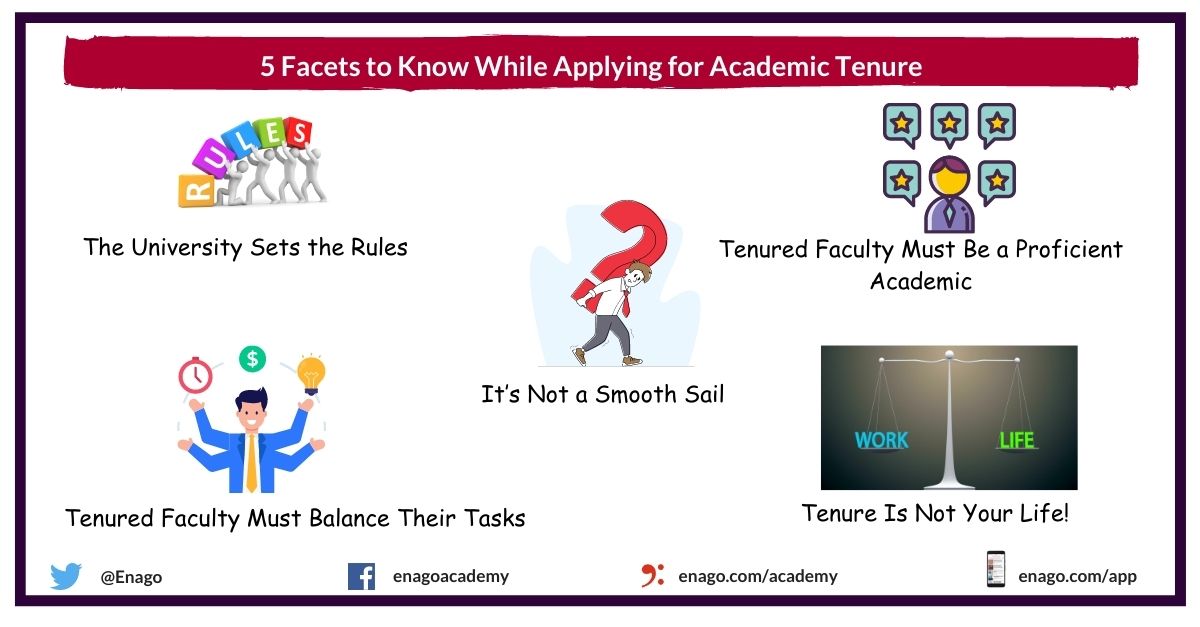Aiming for Academic Tenure? – 5 Things You Should Know Before Applying!

Considered as one of the most coveted achievements in an academic career, it wouldn’t be an exaggeration to say, “Nothing satiates an academic than a tenure!” The academic tenure is a period of guaranteed employment at a university or institution, which offers academic freedom and safeguards a teacher’s employment from unfair firing. In this blog, we will elucidate the importance of academic tenure and what researchers must do to grab this opportunity in their university.
What is Academic Tenure?
An academic tenure is a term contract, which assures an academic’s employment at a university. In other words, it is a parameter set for a teacher’s academic freedom since a tenure can safeguard their position as a teacher/professor. It is considered to be the holy grail in academic teaching.
While tenure doesn’t ensure lifetime employment, it does make the unfair firing of teachers a difficult process; wherein the union, university board, the dean/principal, and the judicial system are involved, not forgetting thousands of dollars in legal fees. In most countries, a tenured teacher can’t be directly dismissed without filing a charge against him/her followed by months of evaluations, judicial hearings, and appeals.
What is the Purpose of Academic Tenure?
The impetus that drives academics towards tenure is the support and academic freedom it brings to protect researchers from being fired for futile opinions from political/social retaliation or due to any form of external influence. The importance of academic tenure is beyond permanence of the position.
The purpose of academic tenure is-
- to safeguard a professor’s academic freedom.
- to guarantee secured employment; however, financial or ethical malpractices can cost you the job.
- to provide mutual benefit to the academic and the institution. While the tenured professor gets security from unemployment, the institution leverages this to pay lower salaries and keep the tenured faculty away from more lucrative opportunities.
Eligibility Criteria for Academic Tenure
Academic tenure is not served on a platter, it is earned! Thus, a faculty aiming to get a tenure track in a university must qualify with the following requirements:
-
General Requirements
- The faculty member must observe professional ethics.
- They must satisfactorily complete a probationary period as a full-time faculty member.
- The faculty member must attain the designation higher or equal to assistant professor.
-
Technical Requirements
- Reputable academic and research profile.
- A faculty’s eligibility for tenure depends on the time they served in teaching positions.
- The faculty member must complete the probationary period, which is six years of full-time teaching experience at the university.
- The tenure does not depend on the rank (however, the minimum requirement is assistant professor), salary, or conditions of initial appointment.
5 Facets to Know While Applying for Academic Tenure
1. The University Sets the Rules
Hypothetically, if a university grants 20 years of tenure to a new professor, it commits to an average salary and benefits of around $75,000, which equates to $1.5 million. Thus, to safeguard the university from any losses herein, they include phrases in the tenure guidelines stating that the tenure will be granted when it is in the best interest of the university. The tenure primarily reflects the university’s needs and later focuses on the applicant’s achievements. Moreover, changing budgets and administrations also affect the standards of tenure grants. Therefore, comparing previous tenure recipients’ cases may not be an ideal approach to consider for new tenure applicants.
2. Tenured Faculty Must Be a Proficient Academic
A tenured faculty member is inevitably expected to excel in the three broad categories of the profession—research, teaching, and service. It includes several activities such as procuring grants, conducting and leading cutting-edge research, contributing to literature, advising peers and graduate students, publishing in eminent journals, presenting at national and international conferences, conducting scholarly seminars and discussions, and teaching graduate and undergraduate courses, reviewing scholarly papers, etc.
3. It’s Not a Smooth Sail
Embarking on a tenure track involves several risk factors that may turn it into an unsuccessful tenure case. The risk factors include starting a position without pursuing a postdoctoral position, not attaining key laboratory resources, being in a limited funding field, etc. Furthermore, being a multi-disciplinarian may lead you to lose your tenure track if majority of the department is unfamiliar with your subject expertise. Thus, it is imperative to evaluate your own case and mitigate such risk factors in your best interest.
4. Tenured Faculty Must Balance Their Tasks
While embarking on a tenure track is difficult, one must not alter their priorities and efficiently allocate time among various duties of a professor. In some cases, conflicts may arise between your preferred course of action and the action you believe is most likely to lead to success. Thus, you must manage your tasks based on priorities.
5. Tenure Is Not Your Life!
There is always one more paper to write, yet another proposal to submit, just another hour to complete a presentation; this trail would never stops. Although crucial, you must understand that academic tenure is just one facet of your career, let alone your life. Thus, it is imperative to strike a balance between work and personal life to achieve sustainability in both.
Final Thoughts!
Increasing the number of professors who are passionate about learning, are devoted to research, and who find joy in nurturing juniors by sharing knowledge make you an excellent tenured faculty. Therefore, make sure you check through all these facets while applying for your academic tenure. Let us know what drives you to be a tenured professor other than job security!










![What is Academic Integrity and How to Uphold it [FREE CHECKLIST]](https://www.enago.com/academy/wp-content/uploads/2024/05/FeatureImages-73.png)
good article to read